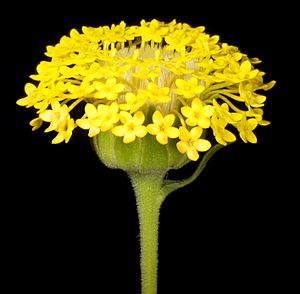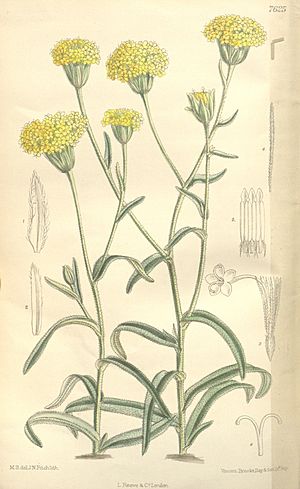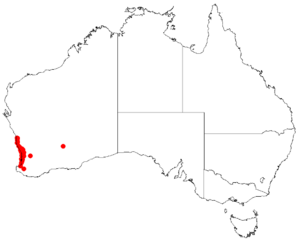Podotheca chrysantha facts for kids
Quick facts for kids Podotheca chrysantha |
|
|---|---|
 |
|
 |
|
| Scientific classification |
|
| Kingdom: | Plantae |
| Clade: | Tracheophytes |
| Clade: | Angiosperms |
| Clade: | Eudicots |
| Clade: | Asterids |
| Order: | Asterales |
| Family: | Asteraceae |
| Genus: | Podotheca |
| Species: |
P. chrysantha
|
| Binomial name | |
| Podotheca chrysantha (Steetz) Benth.
|
|
 |
|
| Occurrence data from AVH | |
| Script error: The function "autoWithCaption" does not exist. | |
| Synonyms | |
|
Ixiolaena chrysantha Steetz |
|
Script error: No such module "Check for conflicting parameters".
The Podotheca chrysantha is a beautiful yellow wildflower. It is a small plant that grows only in Western Australia. This plant is part of the Asteraceae family, which is also known as the daisy family.
It usually grows to be about 20 to 50 centimeters tall. You can see its bright yellow flowers blooming from August to December. This is during the late winter and early summer months in Australia. The plant prefers to grow in sandy soil, often found on limestone ridges or in wet, low areas.
Contents
Discovering the Podotheca Chrysantha
Scientists give every living thing a special two-part name. This helps everyone around the world know exactly which plant or animal they are talking about. This system is called taxonomy.
Who Named This Plant?
The Podotheca chrysantha was first described in 1845. A botanist named Joachim Steetz gave it the name Ixiolaena chrysantha. Later, in 1867, another famous botanist, George Bentham, moved it to the Podotheca group of plants. This is how it got its current scientific name.
Where Does This Plant Live?
The Podotheca chrysantha is endemic to Western Australia. This means it is found naturally only in that specific area and nowhere else in the world. It thrives in certain types of soil and environments.
Its Favorite Home
This plant loves to grow in sandy soil. You can often find it where sand covers limestone or laterite rock. It also grows well on limestone ridges. Sometimes, it even grows in wet, low-lying areas, which are like small dips in the land that collect water.
Why Are Wildflowers Important?
Wildflowers like the Podotheca chrysantha are a vital part of their ecosystem. They provide food and shelter for many small creatures. They also add beauty to the natural landscape.
Protecting Our Plants
It is important to protect native plants. They help keep the environment healthy. By understanding where plants like the Podotheca chrysantha grow, we can help make sure they continue to thrive for many years.
 | Aurelia Browder |
 | Nannie Helen Burroughs |
 | Michelle Alexander |

